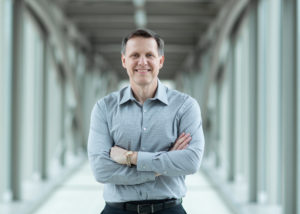Giving Families Hope: Bobby Eklofe’s 30-Year Career in Mental Health Treatment

Growing up, Bobby Eklofe enjoyed taking on roles in the community that allowed him to help others. Whether he was a Youth Advisor for the local YMCA, a Resident Advisor in college or just providing counseling to other students on campus, Bobby found great fulfillment in supporting others. After trying out careers in television news, retail management and banking, he found they didn’t bring him the same passion as his part-time jobs in social services. Over time, those part-time jobs turned into full-time jobs and he started to excel in those fields because he liked what he was doing and felt great personal fulfillment.
“We all have our own definition of what makes us rich. If you enjoy what you’re doing, you’re going to be rich in life. What better job than to care for families and children and help them on their journey to recovery. You can’t replace that. Once you get a taste of it, you want to continue that feeling of knowing you’re helping others. You’re investing in the future of children and families.” — Bobby Eklofe
Bobby Eklofe, M.H.S.A., serves as President of KVC Hospitals and has been a pillar of the KVC team for 30 years. He is a servant leader who has held a range of positions in social services, including patient care, human resources, training, hospital administration and executive leadership. Bobby spreads his passion and expertise throughout the state and has done so by serving on many local and state stakeholder committees in Kansas to advocate for community behavioral health needs.
We recently interviewed Bobby about his wealth of experiences over the past 30 years and his vision for the future of KVC Hospitals. He also talked to us about the most common misconceptions with children’s psychiatric hospitals and why KVC Hospitals places so much emphasis on treating the whole person.
Q: Your career and KVC have grown and evolved together, influencing each other’s successes. What is it like to look back at how much has been accomplished and to see your part in that?
Bobby: It’s very rewarding to think about how far we’ve come and how many people we’ve helped. I instantly think of all the staff I have worked with throughout the years who have touched my life by carrying out our mission. It’s also fun to remember the moments when I have experienced staff impacting each other’s lives and coming together as a family. We learn every day from the people around us and it’s important to embrace those moments. KVC has given me three decades of a supportive culture and personal fulfillment.
Q: What has been your favorite experience with KVC so far?
Bobby: I will always take pride in being part of a team that has helped children on their road to recovery. We have so many sad stories that come through our doors every day—children and parents who are struggling to live happy lives. When I get to see someone leave our hospital happier and healthier or when a parent thanks us for helping their child, it’s an amazing feeling. There is nothing more fulfilling than the times I have seen someone out in the community years after we have helped them, and they are on a good path in life. It’s amazing to know that we’ve contributed to the happiness and future of others. No matter how many times you experience that feeling, it always makes you feel good inside. You can’t replace that with any amount of money or other affirmation.
Q: What is your vision for KVC Hospitals’ future?
Bobby: I want to see us redefine the continuum of care. As an organization, we are leaders in offering a continuum of care that most places don’t. We can provide children and families with a range of long-term services and consistency, which is important for the effectiveness and timeliness of treatment. We want to keep building out quality services within that continuum. We have the experience and determination to innovate care. We are always moving forward and building. I think our expertise will continue to fill gaps in care not just in Kansas but throughout the nation.
Q: You’ve been a leader to KVC in many ways. How do you describe your leadership approach?
Bobby: I have modeled my leadership style by asking myself what I want in a leader. I have a style that is fair and supportive, but I also hold people accountable. As long as the accountability is fair, you can help someone grow. I also strive to inspire people and build trust. In those times you don’t agree, if you have trust then it’s easier to work through challenging moments. With trust, you also enable others to act and make decisions. People are going to fail at times but for them to grow, they have to make those decisions and then you guide them if they’re struggling. For me, a big part of building trust is owning who I am as a person, feeling good about that and not straying. If you start to copy others or change who you are, then you won’t feel authentic—and authenticity is key to trust.
When it comes to decision making, I use my heart and brain. It’s OK to feel as long as you are also thinking it through. We have to do what is best for the people we serve and the organization—it’s a continuous balance. We’ve all probably heard the saying, “without a margin there’s no mission.” But without a mission, we aren’t going to have a margin. There must be a balance and you have to use your heart to make sure that whatever you’re doing is for the right reasons.
Q: What are common misconceptions about children’s psychiatric hospitals?

Bobby: With a hospital like ours, the stereotype is often that we only treat youth with the most severe mental illness diagnoses. While we do treat severe cases and children who have experienced trauma, we treat children of all ages experiencing all different types and levels of diagnoses. Most of the youth we treat are experiencing depression or mood disorders and need rapid stabilization and resources to help them maintain their health outside of our facilities. They come to us because they are lost and need support, and they CAN turn that around.
Another common misconception is that we think it’s the parent’s fault—and that couldn’t be further from the truth. Or often the parents who bring a child to us for help think that they’ve failed as a parent, and that also isn’t true. I compliment any parent who is seeking treatment for their child. We aren’t only here to help the child, but we also support parents by giving them hope and helping them set up a platform for success for their child.
Our goal is to support parents by working together to help their children overcome mental health challenges. We are supporting the whole family on their road to recovery and we want to see each child go home to his or her family with additional supports and resources for success moving forward.
About KVC Hospitals
KVC Hospitals provides behavioral health services for children and teens ages 6-18 who struggle with depression, anxiety, trauma, suicidal thoughts and other mental health challenges. Each year, we help thousands of youth through our network of inpatient hospitals and psychiatric residential facilities by providing treatment and teaching youth about their brain development, emotions and responses in different situations. This helps them understand their mental health diagnoses and how to manage their emotions in tough situations and helps them strengthen their brains.
If you’re looking for a rewarding career where you can help children heal from behavioral health challenges, visit our Careers page.






